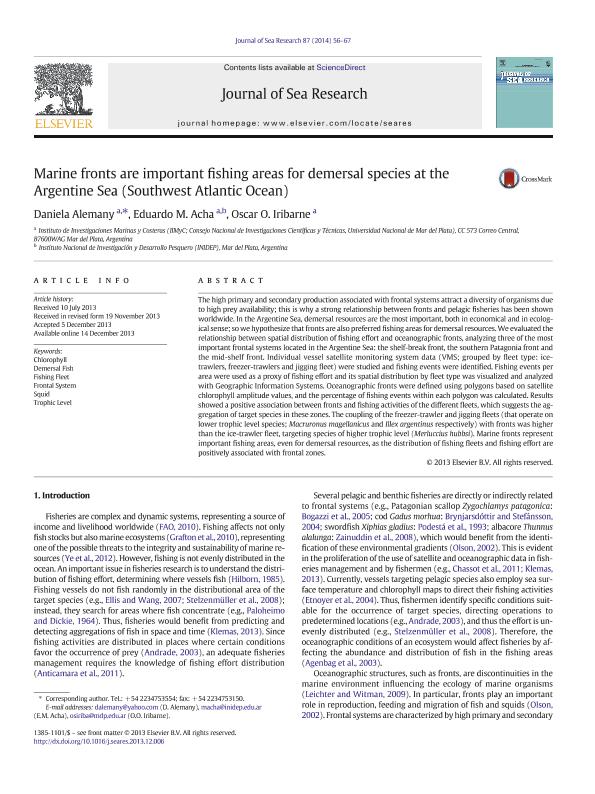Mostrar el registro sencillo del ítem
dc.contributor.author
Alemany, Daniela

dc.contributor.author
Iribarne, Oscar Osvaldo

dc.contributor.author
Acha, Eduardo Marcelo

dc.date.available
2017-10-02T18:41:14Z
dc.date.issued
2014-01
dc.identifier.citation
Alemany, Daniela; Iribarne, Oscar Osvaldo; Acha, Eduardo Marcelo; Marine fronts are important fishing areas for demersal species at the Argentine Sea (Southwest Atlantic Ocean); Elsevier Science; Journal of Sea Research; 87; 1-2014; 56-67
dc.identifier.issn
1385-1101
dc.identifier.uri
http://hdl.handle.net/11336/25640
dc.description.abstract
The high primary and secondary production associated with frontal systems attract a diversity of organisms due to high prey availability; this is why a strong relationship between fronts and pelagic fisheries has been shown worldwide. In the Argentine Sea, demersal resources are the most important, both in economical and in ecological sense; so we hypothesize that fronts are also preferred fishing areas for demersal resources. We evaluated the relationship between spatial distribution of fishing effort and oceanographic fronts, analyzing three of the most important frontal systems located in the Argentine Sea: the shelf-break front, the southern Patagonia front and the mid-shelf front. Individual vessel satellite monitoring system data (VMS; grouped by fleet type: ice-trawlers, freezer-trawlers and jigging fleet) were studied and fishing events were identified. Fishing events per area were used as a proxy of fishing effort and its spatial distribution by fleet type was visualized and analyzed with Geographic Information Systems. Oceanographic fronts were defined using polygons based on satellite chlorophyll amplitude values, and the percentage of fishing events within each polygon was calculated. Results showed a positive association between fronts and fishing activities of the different fleets, which suggests the aggregation of target species in these zones. The coupling of the freezer-trawler and jigging fleets (that operate on lower trophic level species; Macruronus magellanicus and Illex argentinus respectively) with fronts was higher than the ice-trawler fleet, targeting species of higher trophic level (Merluccius hubbsi). Marine fronts represent important fishing areas, even for demersal resources, as the distribution of fishing fleets and fishing effort are positively associated with frontal zones.
dc.format
application/pdf
dc.language.iso
eng
dc.publisher
Elsevier Science

dc.rights
info:eu-repo/semantics/openAccess
dc.rights.uri
https://creativecommons.org/licenses/by-nc-nd/2.5/ar/
dc.subject
Chlorophyll
dc.subject
Demersal Fish
dc.subject
Fishing Fleet
dc.subject
Frontal System
dc.subject
Squid
dc.subject
Trophic Level
dc.subject.classification
Bioquímica y Biología Molecular

dc.subject.classification
Ciencias Biológicas

dc.subject.classification
CIENCIAS NATURALES Y EXACTAS

dc.title
Marine fronts are important fishing areas for demersal species at the Argentine Sea (Southwest Atlantic Ocean)
dc.type
info:eu-repo/semantics/article
dc.type
info:ar-repo/semantics/artículo
dc.type
info:eu-repo/semantics/publishedVersion
dc.date.updated
2017-09-29T16:34:49Z
dc.journal.volume
87
dc.journal.pagination
56-67
dc.journal.pais
Países Bajos

dc.journal.ciudad
Amsterdam
dc.description.fil
Fil: Alemany, Daniela. Consejo Nacional de Investigaciones Científicas y Técnicas. Centro Científico Tecnológico Conicet - Mar del Plata. Instituto de Investigaciones Marinas y Costeras. Universidad Nacional de Mar del Plata. Facultad de Ciencia Exactas y Naturales. Instituto de Investigaciones Marinas y Costeras; Argentina
dc.description.fil
Fil: Iribarne, Oscar Osvaldo. Consejo Nacional de Investigaciones Científicas y Técnicas. Centro Científico Tecnológico Conicet - Mar del Plata. Instituto de Investigaciones Marinas y Costeras. Universidad Nacional de Mar del Plata. Facultad de Ciencia Exactas y Naturales. Instituto de Investigaciones Marinas y Costeras; Argentina
dc.description.fil
Fil: Acha, Eduardo Marcelo. Consejo Nacional de Investigaciones Científicas y Técnicas. Centro Científico Tecnológico Conicet - Mar del Plata. Instituto de Investigaciones Marinas y Costeras. Universidad Nacional de Mar del Plata. Facultad de Ciencia Exactas y Naturales. Instituto de Investigaciones Marinas y Costeras; Argentina
dc.journal.title
Journal of Sea Research

dc.relation.alternativeid
info:eu-repo/semantics/altIdentifier/url/http://www.sciencedirect.com/science/article/pii/S1385110113002463
dc.relation.alternativeid
info:eu-repo/semantics/altIdentifier/doi/http://dx.doi.org/10.1016/j.seares.2013.12.006
Archivos asociados
